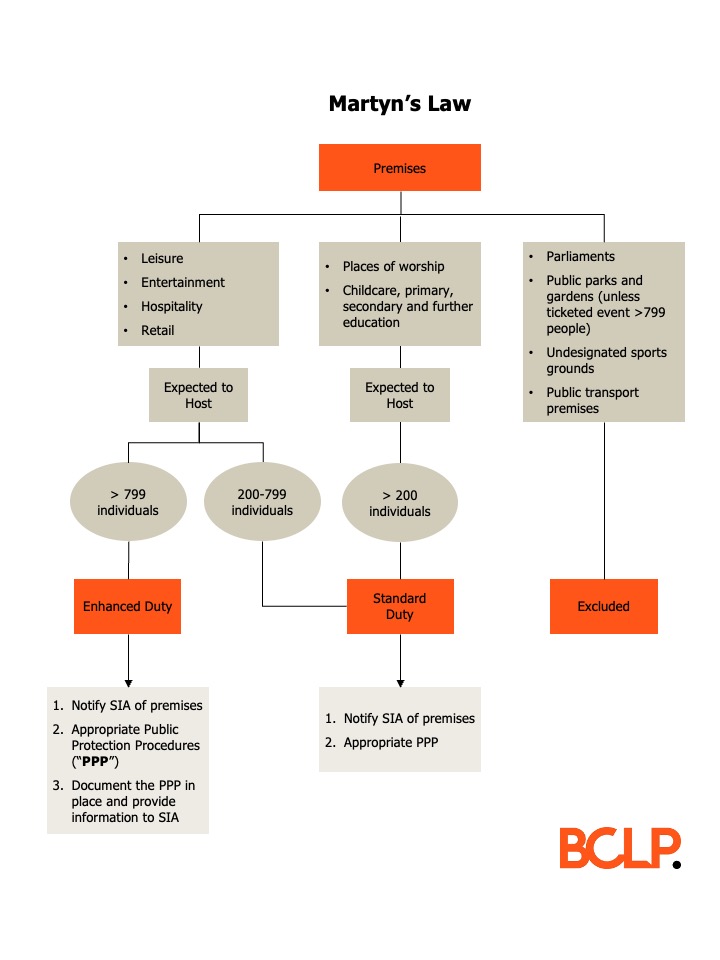Insights
Are you ready for Martyn’s Law?
Apr 16, 2025Summary
Background
Following the Manchester Arena attacks in 2017 and the London Bridge and Borough Market Inquests, the government set out to clarify legal responsibilities for improving the safety and security of public venues in the event of a terrorist attack. The Terrorism (Protection of Premises) Act, also known as “Martyn’s Law” (after Martyn Hett, a victim of the Manchester Arena attack) will introduce requirements for those responsible for certain publicly accessible premises and events to consider (1) the vulnerability of their premises/event to a terrorist attack, and (2) how they would respond to an attack, in order to improve their protective security and organisational preparedness.
What premises and/or events will Martyn’s Law apply to?
Martyn’s Law will principally apply to public premises that are wholly or mainly used for retail, hospitality, entertainment and leisure purposes. It will also extend to designated sports grounds, libraries, museums, galleries, hotels, places of worship, hospitals/healthcare premises, bus and railway stations, educational premises (nursery, primary, secondary, tertiary), certain venues for hire for events and visitor attractions.
The Act lists certain categories of premises and types of events that will be excluded from Martyn’s Law. Premises housing “legislatures” (e.g. Houses of Parliament), freely accessible parks and gardens, undesignated sports grounds and certain types of public transport premises will be excluded. However, events hosting at least 800 people that are held at freely accessible public parks and gardens could be considered to be “qualifying events” and could thus fall in scope. Also, even though places of worship and education will generally fall under “qualifying premises” (see above), events held at those types of premises will not be regarded as “qualifying events” (on the basis of pre-existing safety and safeguarding policies and procedures in place at these establishments).

What duties and obligations will be imposed?
The duties and obligations imposed by the Act will depend on the number of individuals expected to be hosted at the premises from time to time (with a minimum threshold of 200 people). Enhanced duties will apply where the relevant premises are expected to host at least 800 individuals from time to time, which will require additional measures for qualifying events. Standard duties will apply to all other types of qualifying premises expected to host between 200 and 799 individuals at one time.
Persons responsible for standard duty premises will be required to notify the regulator of their premises and put in place appropriate and reasonably practicable public protection procedures to be followed by people working at the premises if an act of terrorism was to occur at the premises or in the immediate vicinity. This includes ensuring that there are procedures in place to provide information to individuals on the premises and to evacuate, invacuate or lockdown the premises. The aim of these requirements is to improve staff preparedness and responses. The ‘reasonably practicable’ element will enable standard duty premises to tailor their approach to the resources they have available.
In the case of enhanced duty premises and qualifying events, the same procedures as standard duty premises apply but in addition, persons responsible for enhanced duty premises and qualifying events will be required to document the public protection procedures and measures in place, or proposed to be put in place, and provide this document to the regulator. This document should include an assessment as to how those procedures and measures may be expected to reduce, so far as is reasonably practicable, vulnerability and risk of harm.
Whilst “public protection procedures” are reactive to an attack, the enhanced “measures” are proactive and preventative.
Martyn’s Law will also bring changes to the Licensing Act 2003 aimed at preventing sensitive information in premises plans being publicly available. Licence applicants will be required to supply two plans in support of their applications – the first being a detailed plan for use by the Local Licensing Authority, and the second being a less detailed plan that will be made available for public inspections. However, businesses with licenses already in place will not be required to replace pre-existing plans, even if they are non-compliant with the new requirements.
Who will be responsible for qualifying premises or events?
A person will be responsible for qualifying premises if they have control of the premises in connection with their qualifying use (or principal use where premises are used for two or more specified uses). In the case of a qualifying event, the responsibility falls to the person who has control of the premises at which a qualifying event is to be held. For example, the operator of an arena or the governing body of a school will be the responsible persons.
Whilst this person may be an individual, in many cases it is anticipated to be an organisation. However, where the responsible person for enhanced duty premises or a qualifying event is not an individual, they must appoint an individual as a designated senior individual with responsibility for ensuring that the relevant requirements are met. If more than one person is responsible for the qualifying premises/event, each person will be jointly responsible for complying with the requirements imposed by Martyn’s Law.
Who will enforce the prOvisions of Martyn’s Law?
The Security Industry Authority will have regulatory oversight and powers to assess and enforce compliance with Martyn’s Law. Its powers will include the ability to issue compliance notices, notices restricting the use of venues in the case of non-compliance, and financial penalties.
How should you prepare?
Those who are responsible for/have control of premises should start to consider if their premises qualify as standard or enhanced duty premises, and/or if qualifying events will be held at their premises; they need to think about who the appropriate responsible person/people will be and consider, formulate and document (if need be) reasonably practicable public protection procedures to be adopted in the event of a terrorist attack.
Dedicated guidance, that the government has said will “be easy to follow, needing neither particular expertise nor the use of third-party products or services”, will be provided for duty holders to ensure that those in scope have the required information on what to do and how best to do it.
If you have any concerns or queries or would like to discuss if you/your premises will be impacted by Martyn’s Law, please do get in touch with our Real Estate Disputes Team.
This article was drafted with the assistance of Lilia Raykova, trainee.
Related Practice Areas
-
Real Estate Disputes
-
Real Estate






